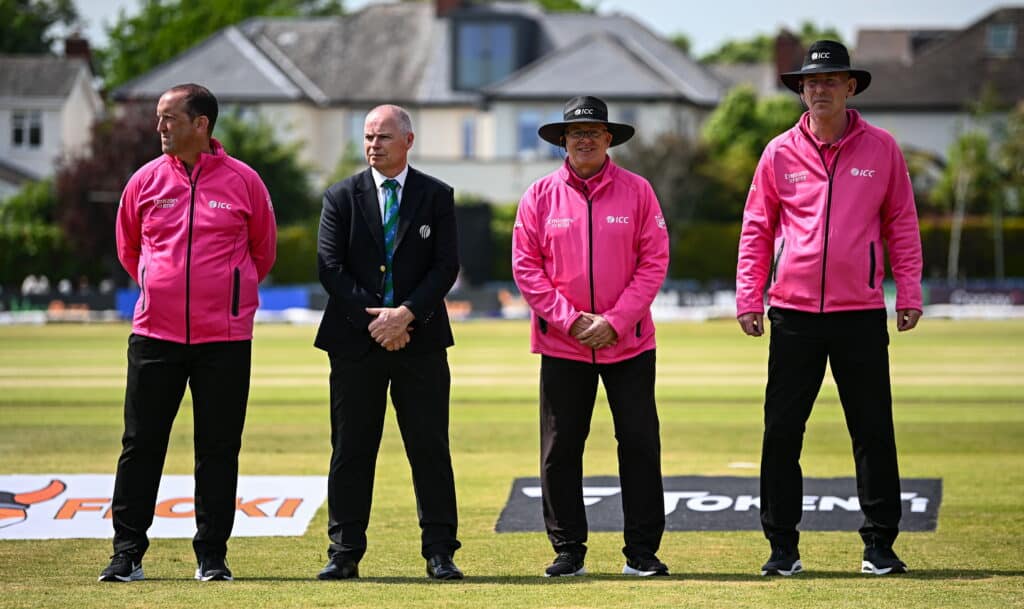With the new season just around the corner, it’s not just players getting ready for a big summer ahead – it’s all the umpires and match officials too. And sometimes, our leading umpires pop up in some unexpected places!
Like the players, the off-season isn’t always a time of rest for umpires and match officials. It can be a time for planning ahead and overall development. Some have been keeping busy in competitions all around the world.
Since 2019, we have had Irish officials stand in matches across 21 countries around the world whether it has been bilateral series, World Cup Qualifiers globally in different regions, the ECB’s County Second XI competition or even the Lanka Premier League and the Super Smash in New Zealand.
A number of leading Irish umpires have even participated in international exchanges to the Caribbean and the UK.
Ahead of the new season, Irish umpire Aidan Seaver spoke to us about his recent experience officiating at the 2025 ICC Under-19 Women’s World Cup in Malaysia, about moving through the levels to where he is now, testing yourself, and what it’s really like umpiring in a World Cup final.
So how was it umpiring at the ICC Under-19 World Cup in Malaysia?
Aidan Seaver: I was stationed just outside Kuala Lumpur for the four weeks. I’d left home on the 7th of January just at the beginning of 2025 and we landed in Malaysia on January 8th. Between the warm-up games and the ICC umpiring workshops, that brought us up to January 18th when the tournament began. Some of the other umpires moved on to Borneo and Sarawak, while some went down to Johor where the Ireland team were playing. But I ended up staying in Kuala Lumpur for the full tournament.
Well tell us about your experience in the final – what was that like?
AS: It was definitely surreal. I was third umpire [TV official] in the final, so I wasn’t out in the middle. But I mean there was a crowd of over two and half thousand at it. Mostly Indian, so there was a bit of atmosphere. Then there was the whole occasion of the event from start to finish with the big flags coming out onto the field of play for the teams. There was the players and the umpires going out and standing there for the national anthems.
Obviously, I was based in the TV room but you’re just standing there for the anthems realising that this is a World Cup final. I’m a lad who played bad cricket for Wexford at division god knows what. Going from there to now officiating in a World Cup final. It was pretty surreal to be honest.
Tell us about some of the big games you were involved in?
AS: A few of my games ended up being really close. I was an on-field umpire for Australia vs Bangladesh [Australia U-19 Women beat Bangladesh U-19 Women by just two wickets chasing 92]. I was TV umpire for Australia versus Sri Lanka, which Sri Lanka ended up winning [Sri Lanka U-19 Women beat Australia U-19 Women by only 7 runs]. Then I was on-field umpire as well for India versus Sri Lanka, which India won well in the end. But again, it was a good match with a good crowd. All the Indian matches had a bit of an audience. But a lot of the matches there in Malaysia certainly weren’t run-of-the-mill. There was always something going on. Yeah, it was excellent.
How did you find the challenges of being in a big tournament like that?
AS: For me, the biggest thing during the whole tournament was getting more exposure, specifically in the role of TV umpire. Prior to the tournament, I’d had one TV umpire role at the Ireland Women versus England Women T20I match in Clontarf last year. Overall, I had five matches as TV umpire during this World Cup. It really gave me a lot of confidence being able to do that. But more importantly, I think I did it well enough. I won’t say it was challenging; more so it was something a bit different working with nearly fifteen other umpires from different countries. So I think it was getting used to being with and spending time in the company of a lot of umpires who have different ways of doing things. Then, I married my processes with theirs so that there were no issues. It wasn’t a challenge as such. But it was something I really benefited from.
What motivated you first of all to take up umpiring?
AS: The major thing was at the level I was playing, we often umpired all our own matches. And there’s nothing quite as frustrating as being umpired by someone who you feel doesn’t know the laws of cricket. I’m sure Peter Thew wouldn’t term it as this, but I did a course which was sort of a basic guide to umpiring really for players to know the basics. What to look out for, the basic laws, how to handle a five or ten over stint in a match etc. I found I enjoyed the course. Peter mentioned that there was an official Level One course or whatever it was called at the time being held in Terenure Cricket Club later that year. So then I decided to sign up.
Then what was the next step for you?
AS: Again, I really enjoyed that course and said: ah sure, look it, I’ll do a few games. Then, by the end of the first season, I found that I was umpiring at a much, much higher level than I was ever capable of playing at. I would certainly consider myself one of those characters who wants to see how far they can get before they find their level. So that’s really how I got into it. That’s how I started. And I don’t think I’ve found my level yet. Maybe that sounds big-headed, but what I mean is that in this last year, I umpired the Men’s white ball series between Ireland and South Africa in Abu Dhabi with Richard Illingworth. And I’m still being given higher-level matches. So, until the time comes for a setback, I’ll keep testing myself.
What are the key moments you feel that have shaped your development along the way?
AS: Doing the courses and you know challenging myself to try and umpire at the highest level I could. I suppose when I first officiated in Premier League cricket in Leinster it was a big step up because none of the players would have known who the hell this lad from Wexford was. And you know, it would have taken me a while to find my feet at that level. Every time you step up, there’s a bit of a challenge involved. That’s when you go from Premier League cricket to List A and Inter-Provincial cricket. Then again you go from Inter-Provincial cricket up to International cricket.
You described the World Cup final as being surreal. What other moments have felt like that umpiring?
AS: I’d just called “play” when I was officiating for Ireland Men vs Pakistan Men back in May 2024 and then I suddenly had Shaheen Shah Afridi speeding in over my shoulder to bowl the first ball. I was standing there, looking around and thinking to myself there was Mohammad Rizwan and Babar Azam. These are lads I would only have seen on the telly and now I’m in charge of this match. That takes some time getting your head around it. You’ve players you might only have seen on TV calling you ‘Sir’. That’ll never not be a weird one to me. I was watching the South Africa versus Pakistan Men’s Test match there before Christmas and looking at the teams. I think I’d umpired eleven out of the 22 players between the two teams, which again was a bit of a weird one. That for me can be the challenge. It’s getting used to that step up and making sure you always swim instead of sink.
Aidan will be just one of many Irish umpires attending an annual workshop this weekend ahead of the start of the season. The workshop, to be held in Monaghan, is an opportunity for key people within the Irish system, such as Phil Thompson (Match Officials Manager) and Chris Griffin (Cricket Operations Manager), to meet and discuss all matters umpiring with attendees.

2025 Umpiring Panels
The Cricket Ireland umpiring panels for 2025 have been released – congratulations to all the umpires selected:
International Panel
- Roly Black
- Mark Hawthorne
- Jonathan Kennedy
- Aidan Seaver
First-class Panel
- Azam Ali Baig
- George Brolly
- Jareth McCready
- Gareth Morrison
Representative Panel
- Willie Clarke
- Ian Gamble
- Warren McCully
- Vinny O’Hara
- Ashisha Sharma
- Steve Wood
Intermediate Panel
- Brian Alexander
- Ronnie Balfour
- Paul Black
- Brian Boyd
- Declan Earley
- Will Houston
- Srinivasa Karpe
- Colin McClean
- Prashant Tiwari
- Thushara Wijesundera
Development Panel
- Rohini Burkul


























